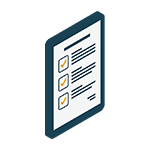While many of us have heard about DEI, many do not fully understand what it means and how valuable it can be for organizations.
DEI stands for diversity, equity and inclusion and is the general term used to describe the strategies and practices aimed at creating a workplace that celebrates people with different experiences, backgrounds and opinions. Employees cannot do their best work unless their basic needs for safety, respect and belonging are met. DEI initiatives help workplaces foster a more inclusive environment for people of all races, ages, sexual identities, people with disabilities, and more.
Why Diversity, Equity and Inclusion Is Important
According to a study conducted by Forbes, diverse teams make better business decisions 87 percent of the time. Statistics also prove that they are more financially successful as well. A study conducted by McKinsey & Company found that ethnically diverse companies are 35 percent more likely to have financial returns above their respective national industry medians. Additionally, gender diverse companies are 15 percent more likely to outperform their respective national industry medians. The reasoning behind this is explained by the simple fact that that a more diverse team brings a wider variety of perspectives, ideas and experiences to the table which can lead to sharpened decision making as a company.
When employees feel included, heard and respected, they are also more engaged at work and are able to bring their authentic selves to the office every day. Inclusion in the workplace leads to a better quality of work, happier employees who feel like they belong, and a more attractive company overall. A recent report from Skillsoft supports the claims that people want to work for inclusive companies, finding that 89 percent of people are in favor of their company hiring people with disabilities, including intellectual disabilities.
Tightly intertwined with diversity and inclusion, equity in the workplace means going above and beyond to provide the necessary tools that each employee needs to do their job to the best of their abilities, while also realizing that everybody is unique. Different employees require more, fewer or different needs than others. Equity means evening the playing field so that all employees have equal opportunities and the tools they need to do their jobs. Based on these statistics, it’s unsurprising that a report from Gartner found that 35 percent of HR leaders say DEI initiatives are one of their top five priorities.
How to Incorporate DEI Strategies in Your Workplace
Implementation of DEI strategies in the workplace includes conducting employee surveys, collecting and analyzing the data, setting clear and measurable goals based on your company’s needs and then holding your workplace accountable to them. From there, the work still isn’t over, as companies need to commit to reevaluating and changing policy to best fit the company.
DEI is not a quick fix for corporate issues and will not transform your company overnight but is a key first step to proving your company’s commitment to fostering a diverse, fair and inclusive environment.
In today’s day in age, most companies say they are committed to diversity and inclusion, but implementing DEI practices based on gathered employee data, as well as holding your team accountable against your goals and values, proves that your company is actually taking action to reach a more equitable workplace.
According to a survey of more than one million employees conducted by Culture Amp, while 85 percent of employees would agree that their workplace is trying to build a more diverse and inclusive culture, only 34 percent believe they are provided the necessary resources and support to do so. Some of the common practices in place to help support a company’s DEI policies include Employee Resource Groups, DEI specific training, and even a designated DEI position.
A Robust Health, Safety, and Compliance Software Platform Can Help
Kokomo24/7® understands that DEI is a new concept for many and implementation of new policies within the workplace can be a daunting task. Kokomo24/7® can provide your business with a robust yet easy-to-use software platform that simplifies the complicated, yet important task of data collection and analytics, streamlining the process of implementing DEI strategies in your workplace.
Get the health and safety platform that you need to navigate the ever-evolving culture of the workplace and aid in creating a more inclusive, equitable and diverse workplace. Ever since Kokomo24/7® was founded in 2018, we have been a leader in compliance and risk management solutions for all things health and safety. Kokomo proudly serves workplaces, schools, and communities. Our mission is to deliver highly effective, easy-to-use, and trusted compliance and risk management solutions that bridge the gap between public safety and technology.
Whether you work for a small company, a fortune-500, or any institution in between, we want to hear from you.
Get Help Implementing Your DEI Plan, Today!

 CASES™
CASES™ ESCALATE™
ESCALATE™ TRIAGE™
TRIAGE™ NOTIFY™
NOTIFY™ FORMS™
FORMS™ ANALYTICS™
ANALYTICS™ HOST™
HOST™ OWLPASS®
OWLPASS® ACCESS™
ACCESS™ WELLNESS™
WELLNESS™ CONNECT™
CONNECT™ CREDENTIALS™
CREDENTIALS™



